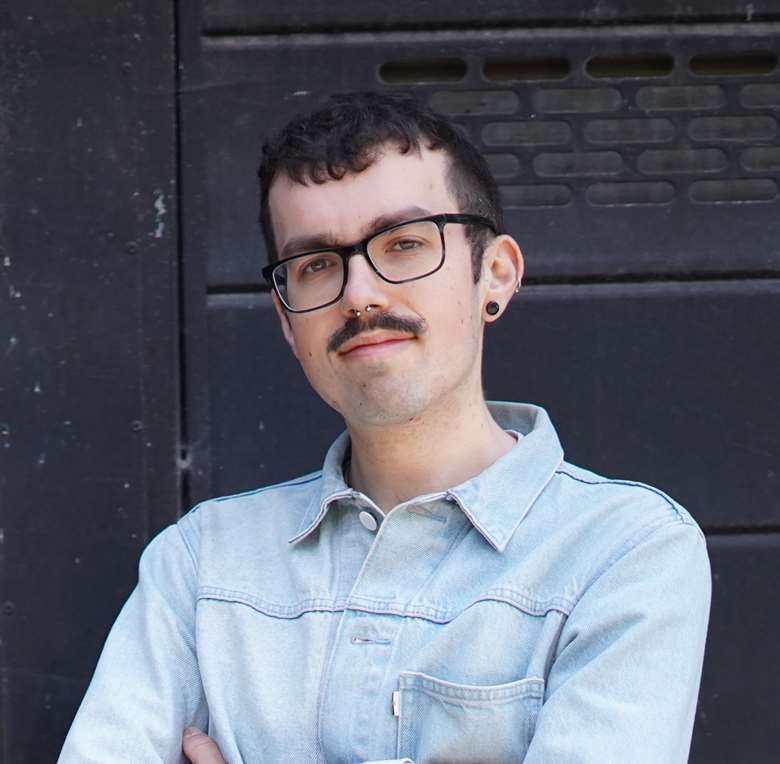Queer inheritance, politics and opera – writing 'Bermondsey, 1983'
Robert Reid Allan
Tuesday, September 5, 2023
Homophobia surrounded the 1983 Bermondsey by-election. Robert Reid Allan's true-story opera looks at this landmark in queer history and questions how far we have still to go

Photo: Ruby Dixon
The 1983 Bermondsey by-election campaign was the most violently homophobic vilification of a public figure since Oscar Wilde. The South London constituency was the site of unimaginable abuse suffered by the Labour candidate Peter Tatchell, now amongst the UK's most prominent LGBT+ and human rights advocates, who faced smears in the press, hundreds of death threats, numerous beatings, and several attempts to burn down his house. The eventual victor, the Liberal candidate Simon Hughes, would himself come out as bisexual in 2006 under pressure from the tabloids who illegally hacked his phone.
While a by-election might seem unusual fodder for a new opera, writer Gareth Mattey and I – equal halves of fledgling production company Forensis Music Theatre – were drawn to the complex knot of personal and political narratives surrounding these events. Having begun in earnest in 2019 via residencies at Snape Maltings and Belgium's LOD muziektheater, this project was upended by the coronavirus pandemic. Four years on, and 40 since the the election itself, Bermondsey, 1983 finally comes to life at Tête à Tête: The Opera Festival 2023.
Our 45-minute opera is a series of multimedia vignettes. A weaving together of recorded interviews, projected video, synthesizers and singers, which work together to interrogate how and why these brutal events came to pass. It's a verbatim piece, meaning that every word comes directly from articles and interviews, both from 1983 and the years since. A new interview that we conducted with Tatchell also features, as he reflects back on the campaign, on the progress made for LGBT+ rights since, and on the relationship between music and politics as a whole.
'This is after all the power of opera – not only to impart information but to deliver the emotional impact of that information along with it'
Chosen family has always been important to us queer people, either as a result of estrangement from our biological families or simply because of the deep bonds shared with those that look, walk and talk like us. With this comes a kind of queer inheritance – I often feel that I'm one in a long line of ancestors who have always existed, and have continued to exist in the face of persecution.
A lot of my job as a composer is celebrating this heritage. Although I was born ten years after the Bermondsey by-election, and thankfully haven't experienced homophobic abuse on anything like the scale that Tatchell did, I feel passionately about learning, understanding and commemorating these landmark events in queer history.

I hope that, by gathering together to experience this piece, our audience will not only learn about this uniquely vicious event, but also learn to empathise with the unenviable circumstances both candidates found themselves in as a result of their sexual identities. This is after all the power of opera – not only to impart information but to deliver the emotional impact of that information along with it.
It might seem that such events could never happen in the UK nowadays. Certainly, in the 40 years since, queer Brits enjoy rights – to marry, adopt and have their gender legally recognised – which previous generations could scarcely imagine. As a queer person born in the mid-1990s, I am significantly safer living now than in just about any time in British history.
But one only need read the news to recognise that we can't be complacent. The last five years have seen a 400% increase in the coverage of transgender issues in the press – too often ill-informed 'debates' which exclude the voices of those most affected by such issues. The tabloids are as keen as ever to break stories of scandals and debauchery, whose homophobic dogwhistles are thinly veiled. Social media platforms are rife with bots and trolls, who are able to cast aspersions against public figures with absolutely no consequence. Even our own Tweets promoting this show have been targeted with such accusations.
I'm under no impression that this opera will help solve any of these problems, but I do hope that by coming together to commemorate this campaign in its 40th anniversary year we – the creatives, the performers and the audience – will examine how such a violent campaign could ever have transpired, and what the long shadow it has cast says about contemporary British politics.
Bermondsey, 1983 appeared at the Cockpit Theatre, Marylebone at 7pm on 3rd September as part of Tête à Tête: The Opera Festival 2023.
You can watch the opera on 16 September for free via the Tête à Tête website. Click here for more information
Robert Reid Allan is a Scottish composer, pianist and activist based in London. With Gareth Mattey they co-direct Forensis Music Theatre. robertreidallan.com






